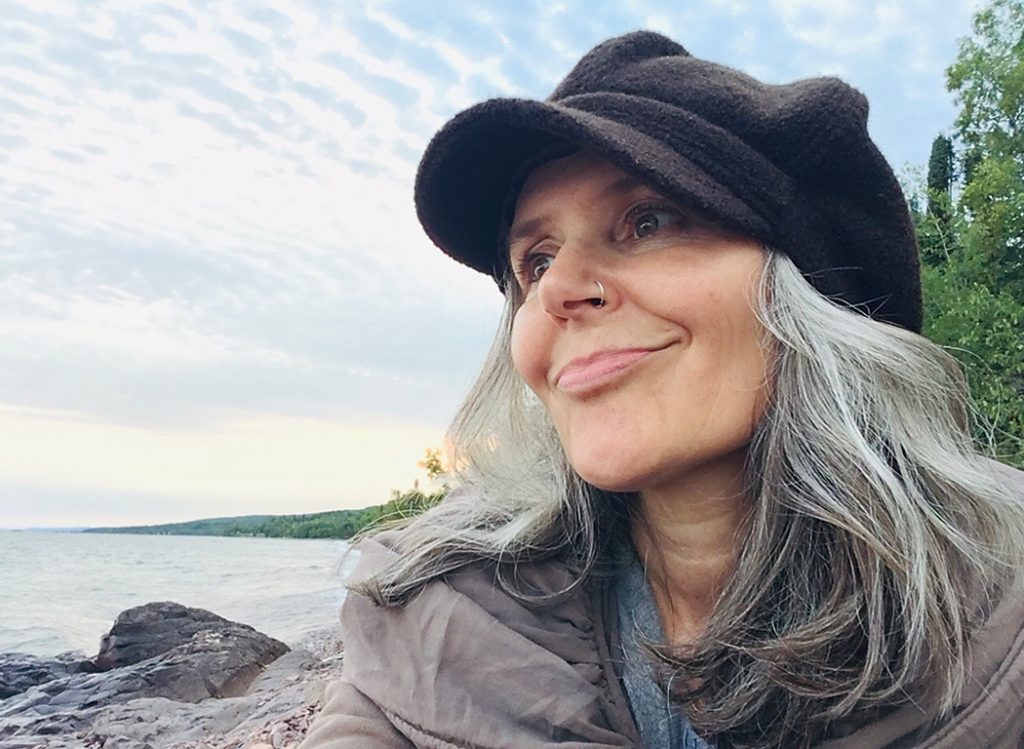
Former Fairfielder Tracy Chipman is a professional storyteller who has delighted audiences for decades. She’ll be visiting Fairfield in June as part of a book tour for her new memoir, Borealis Mundi—Resting in Place, Loss, and Grace.
As a minimalistic storyteller, Chipman doesn’t use costumes or characters but focuses instead on voice and language. “I’m being myself,” she says, “and the story is moving through me.” Chipman is drawn to the reciprocity that happens between teller and listener. “Oral storytelling is inherently collaborative,” she explains. Audience members seem to be passive, just sitting and listening, but “when people start to listen and imagine actively, it becomes this co-creative act.” As the audience actively engages in the story, the teller and the listeners disappear, allowing the story to move in the space between them. “I find it to be a very potent form of collaboration,” Chipman says.
She is also fascinated by the edge between the spoken and written word. Written work can be more linear, and once something is written down, it’s as though it’s set in stone. Speaking can feel more fluid, nonlinear, and temporal. It allows stories to evolve and change in relation to an audience, a time, and a place. “I think there’s something to be gained as a writer by cultivating an oral relationship with language,” Chipman says.
Borealis Mundi
Her new memoir, Borealis Mundi, beautifully combines stories, folk tales, journal entries, poems, essays, map coordinates, and recipes into a soulful narrative exploring love, loss, healing, and the profound grace available through connecting with the natural world. Chipman shares the deep connections she feels to nature and place―most specifically, rural Wisconsin, where she grew up, and the south shore of Lake Superior, where she now resides. Chipman explores how humans connect to place and the nonhuman world, how important those connections are, and how place becomes an important part of our stories.
Chipman’s book began as a series of essays and poems. As she continued to accumulate material, Chipman found she wanted to share her stories with others. She started to do this through oral storytelling but soon realized she would reach a broader audience with a book. “Literacy is the currency that we’re hardwired to at this stage in the 21st century,” she says.
Borealis Mundi opens with a story about the Cailleach, from a Scottish-Gaelic word meaning “crone,” a being both human and mythic who weaves reality on her loom. When the trickster Raven pulls apart her weaving, the Cailleach must grieve and find new inspiration. Chipman experiences the Cailleach as the Creatrix, the birther and destroyer of universes.
“This particular story has been such an ally for me over the course of the last 10-plus years. I just keep going back to it. Where am I in the story? Am I weaving? Am I getting distracted? Am I returning to the loom to find everything destroyed? How am I allowing myself to grieve, so that at some point there’ll be this charm, this allurement that rises up and I can begin again? It felt important to begin with her, especially resonating as a woman who’s now in the domain of crone, of the Cailleach. Who better to start with?”
Chipman shares her experiences dealing with the expected death of her father from cancer and the unexpected death of her new love. She initially finds solace with her grandparents in Gad, her small Wisconsin hometown. The memoir chronicles her life and travels over the next few years as she processes these and other losses while cherishing the stories all around her.
Sharing stories has long been acknowledged as cathartic and transformative. “For better or worse,” Chipman says, “we are made of stories,” referring to poet Muriel Rukeyser’s quote, “The universe is made of stories, not atoms.”
“Stories are the way in and through and under,” Chipman explains. They help us understand and process our experiences and realities. In sharing her intensely personal experiences of loss, grief, and connection to place, Chipman has crafted a profoundly resonant narrative. “They stir things in the reader to explore, causing them to remember their own connection to place, to loss, and to grace,” she says. She wants people to know they are not alone. “Whatever these experiences are―a longing for place or a felt sense of being claimed by place, deep experiences of grief, or experiences of liminality or the numinous ―sharing this can help integrate and normalize these big experiences.”
Chipman acknowledges that there’s often a stigma around talking about death and grief. “And yet, most people have had some kind of profound dissolving of themselves through a sensory experience of this living animate world, whether it’s through a sunset or being by the ocean. There’s value in talking about these experiences now more than ever.”
Over the course of the book, Chipman is introduced to a mentor who asks her, “Is your grief clean?” Allowing grief to flow, without resisting or holding on to it, is an important part of living authentically. Or as Chipman more poetically expresses it, “Becoming more fluent in the language of heart is essential.” She hopes that sharing her stories of loss, rupture, and awe will help readers deal with their own losses and recognize their own joys and interconnectedness.
Events
Tracy Chipman will be offering a workshop on Saturday, June 3, 10:30 a.m.–12 p.m., entitled “The Spoken & the Written: Orality, Imagination & the Written Word” at the Fairfield Public Library. On Thursday, June 8, she’ll give a reading at the Fairfield Public Library at 7 p.m. Finally, Chipman will stage a collaborative performance with Tim Britton entitled Spellbound―Being Claimed by Place at Café Paradiso in Fairfield on Saturday, June 10, at 8 p.m.
